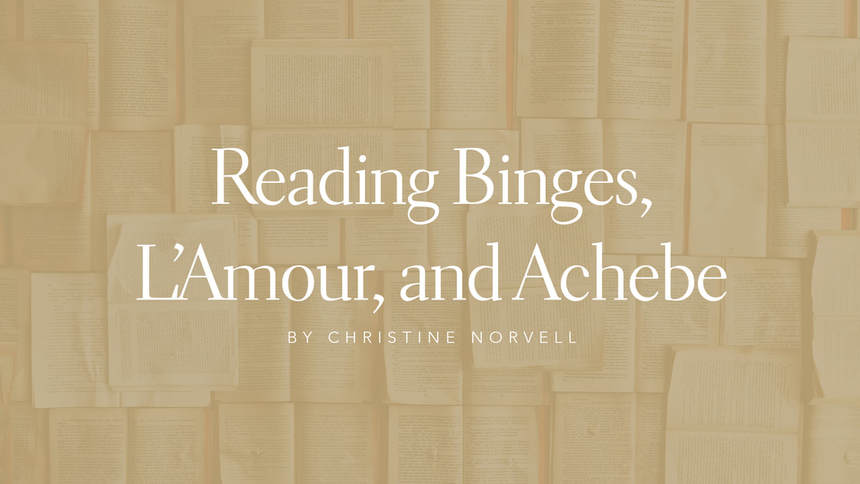|
Binge drinking, binge eating, and binge-worthy shows speak to man’s addictive nature. But what about binge reading? Publishing houses and their marketing machines presume it’s all about sequels and series. “Give them more!” they cry.
But the truth is that avid readers have done it for centuries, even for the same book. Two hundred years ago even the wealthiest purchased subscriptions to lending libraries because books were still quite expensive. Thus, reading audiences across Europe were understandably small until the educated population increased. It’s no wonder that reading more than one book or rereading one would be considered an indulgence. My reading binges usually correspond with school breaks or a long weekend. It’s a predictable thing. Give me some time off of work, especially time in airports, and I speed read. My travel home from Los Angeles last week made way for two full novels in twelve hours. Though I didn’t choose them for depth, I did find myself learning new things and appreciating both authors. Louis L’Amour’s Callaghen features a veteran soldier in his thirties who has the right amount of grit and instinct to stay alive with his patrol in the Mojave Desert post-Civil War. Irish to the core, Callaghen is clear L’Amour hero material: He was a tall man, with wide shoulders, a well-setup man who ordinarily moved easily and with some grace. Around the post he was something of a mystery. He is a clear underdog, and you find yourself easily rooting for a cliched character: He rode straight into the morning, his gun ready, and death rode with him, almost at his side. The story is almost too predictable, too suitable for an easy read. The characterization is flat as can be, but L’Amour has a way with action scenes blended with a heavy setting in this plot. It’s clear that he researched a great deal because the desert is a living character throughout the story, for the desert is always waiting . . . the desert itself speaks, for the earth lives, and in the night’s stillness one can hear the earth growing, hear the dying and the borning and the rebirth of many things. A bit of sand trickles, a rock falls, a tree whispers of moans—these are the breathings of the earth. Oh, the setting! I want to write like that. I was captivated by this place of life and death and felt that alone made the novel worthy reading. Published twenty years later, Chinua Achebe’s sequel to Things Fall Apart, No Longer at Ease is a 1950s drama illustrating the tension of modern culture grating against village wisdom. Achebe’s clever use of dialogue uniquely reflects the people, and I for one, loved to hear them speak. The story follows the life of Nigerian Obi Okonkwo, the eldest son of Isaac Okonkwo and the first selected by the Umuofia village to go to university in London. He has four years to pay back four years of schooling once he returns. And return he does, though not as the expected lawyer nor with the ideal wife. Okonkwo finds employment in the large city of Lagos and quickly discovers how easy it is to spend his advance salary and how to land in debt. As a member of the scholarship board, Okonkwo idealistically refuses bribes of any kind. He expresses how he hoped to be the one who changes the government system, and everyone knows it all runs on bribery. Unfortunately, things do fall apart. His mother falls ill, and he travels to his native village where he is forbidden to marry his girflriend Clara because she is osu, a Nigerian whose family line had once been dedicated to pagan gods. As the plot continues, the one thing I am struck by is how similar this story is to the American play of the 1950s. Think the despondency of Death of a Salesman. Though written in 1994, Achebe lands the story firmly in a patch of modern malaise, the feeling that yes, things will fall apart, and yes, things will only get worse. And more so, the characters and the story will lose hope, if they ever had a bit at all. The theme is familiar, yet Achebe’s writing style remains engaging. My brief binge is over, and I have many books on my platter yet. Yes, a platter. Who has room for a mere plate anyway? Comments are closed.
|


 RSS Feed
RSS Feed